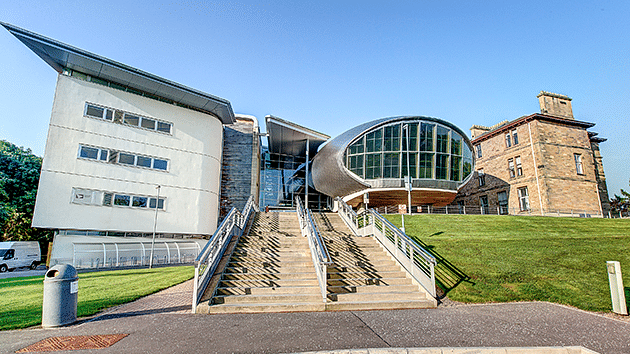BA (Hons) Film is a full-time programme and takes place at the Merchiston Campus and at our purpose-built post-production facilities at Merchiston Avenue.
We offer fully equipped, specialist film facilities including high-end digital cinema cameras, professional film lighting, Avid Media Composer edit suites, Pro Tools, a professional dubbing theatre and a grading suite.
Alongside the more formal teaching content, there is a significant element of self-directed study and research, both individually and via group work.
Through independent enquiry, students are encouraged to develop and realise project ideas towards briefs that are designed to engage with relevant social, cultural and contextual concerns.
Graduates of the BA Film programme are able to engage and work in the following ways:
- creatively and imaginatively
- critically
- practically and technically
- professionally and collaboratively.
At the heart of this programme is the aim of equipping students with (1) the skills that are necessary to be employable in an industry that is largely freelance in nature and (2) the ability to go on to further postgraduate study. Therefore, alongside practical film-making skills, you will develop the ability to communicate your ideas effectively; be a purposeful contributor to collaborative practices; be a capable problem solver and be able to work in a self-motivated and responsible way. These are the essential, transferable professional skills that are required for a successful career in the creative industries.
Portfolio and interview
BA (Hons) Film is a popular programme, attracting a large amount of applicants. Short listed applicants will be invited to submit a portfolio of relevant work and attend an individual face-to-face interview with a member of the programme team. Telephone interviews are also available for overseas applicants.
You will be given set exercises for your portfolio and we will be looking for evidence of your understanding of, and engagement with, film. We will be looking for your visual literacy, interpretative skills and critical evaluation. While consideration will be given to technical knowledge, a high level of technical competence is not expected at this stage, although your potential for future development will be assessed. Please note that you will be sent more specific and detailed requirements when a portfolio is requested.
If invited to interview, you will be able to bring other examples of your work and you should include material which you feel best demonstrates your interest in and passion for film-making. The interview is an opportunity for you to present your work, outline the ideas behind your work, and tell us about what influences and inspires you.
Popular modules
Year 1
- Key Concepts in Filmmaking
- Research and Communication Skills
- Narrative Construction
- Essential Elements of Storytelling (plot, character, dialogue and engaging an audience)
- Editing Sound and Picture
- Systems of Continuity
- Screenwriting
- Film History
Year 2
- Film Histories and Key Theoretical Film Issues
- Documentary Filmmaking
- Cinematic Genres
- Film Adaptation
- Working collaboratively on practical film projects in the roles of:
- Cinematographer
- Editor
- Sound
- Design
- Writer
- Director
Year 3
- Individually tailored filmmaking projects within specialist roles
- Work-related learning
- Critical and analytical abilities required to undertake a research topic
- Visual Anthropology
- Screenwriting
- Documentary Filmmaking
- Opportunity to study abroad
Year 4
- Practical project (typically a short film or collaborative roles on a number of short films)
- Dissertation
- Professional development skills

